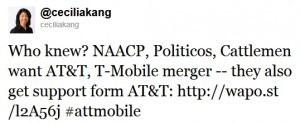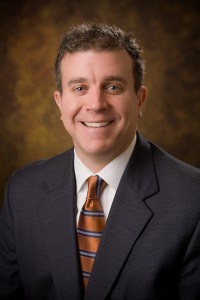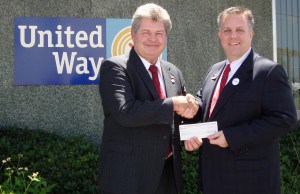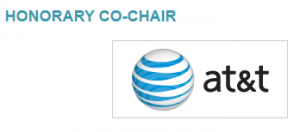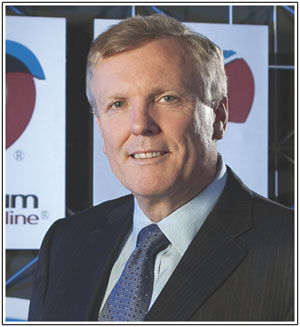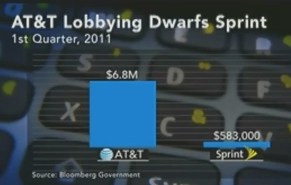 The U.S. Cattlemen’s Association this week took some time out to go all out for AT&T’s proposed merger with T-Mobile. In addition to successfully navigating the FCC’s arcane comment filing system to submit their comments in favor of the merger, the group also penned a lengthy, favorable guest blog for Washington, D.C. inside-the-beltway-favorite, The Hill newspaper:
The U.S. Cattlemen’s Association this week took some time out to go all out for AT&T’s proposed merger with T-Mobile. In addition to successfully navigating the FCC’s arcane comment filing system to submit their comments in favor of the merger, the group also penned a lengthy, favorable guest blog for Washington, D.C. inside-the-beltway-favorite, The Hill newspaper:
The expansion of next-generation wireless broadband envisioned by the T-Mobile and AT&T merger, for example, is critical for the next stage of rural America’s evolution and success. It will allow ranchers, farmers, and all rural residents who have been traditionally underserved to finally gain access to the best that mobile broadband has to offer, including faster and more reliable connections. We strongly encourage the Federal Communications Commission to support these developments as an investment in both the current and future generations of agricultural producers and small communities across rural America.
The cattlemen’s group has had a lot to say about telecommunications issues, especially mergers and acquisitions. It was cited by Verizon as a supporter of its merger with Alltel in 2008, signed a joint letter in 2008 from industry-connected Connected Nation for a broadband plan compatible with the interests of the nation’s largest cable and phone companies, wrote a letter to the FCC opposing Net Neutrality in 2009, and submitted two pages of comments in May favoring the merger between AT&T and T-Mobile.
Apparently there is plenty of free time on the ranch to ponder billion dollar telecommunications mergers.
The argument from the group is that permitting mergers and blocking open net policies like Net Neutrality will convince carriers to provide enhanced service in rural areas where cattle ranches predominate. But facts in evidence illustrate how wrong-headed that argument is:
- Verizon’s merger with Alltel has done nothing to bring its LTE network to rural America. Verizon is focusing LTE upgrades on the markets where it makes the most business sense, and that does not include rural Texas or Oklahoma;
- The National Broadband Plan has directed stimulus funding for rural projects that are most likely to reach their ranch members — wireless ISPs and rural DSL. The cattlemen’s group has nothing to say about either provider;
- Net Neutrality and the policies of an open and free Internet have no real impact on rural broadband deployment. The same companies refusing to provide service yesterday are still refusing to provide service today, and that includes completely exempted wireless providers;
- T-Mobile’s urban-suburban focus is a mainstay of its business plan. T-Mobile has never prioritized rural America as a viable service area, relying on roaming agreements to fill in service gaps. Combining its urban-focused wireless infrastructure with AT&T will add nothing to the rural wireless experience.
Advocating for a merger with T-Mobile makes about as much sense as the group advocating for a T-Mobile merger with Leap Wireless’ Cricket or MetroPCS. All have a record of indifference about providing service in rural areas themselves.
So why does the group persist in fronting for AT&T’s public policy agenda? Cecilia Kang at the Washington Post tweeted the obvious answer — they receive support from AT&T.
The piece for The Hill was penned by Jess Peterson, the cattlemen group’s executive vice president. But Peterson has a second career: president of Washington, D.C.-based Western Skies Strategies, a lobbying firm that promises “success and profitability to our valued clients every time.”
The concept of dollar-a-holler public advocacy is not new, but AT&T is the Master of the Astroturf Universe. The Center for Responsive Politics notes that from 1989 to 2010, no single company spent more on campaign contributions than AT&T. Since 2008, more than $1.25 million has been “donated” to politically-connected charities and those willing to lend their name and reputation to back the company’s public policy agenda.
Facts have a hard time penetrating piles of cash, but here are some anyway:
- T-Mobile’s combination with AT&T may create additional capacity for the combined company, but almost entirely in urban and suburban areas that will do nothing to help rural wireless.
- No telecommunications company has a track record of providing service in areas unprofitable to serve or fail return on investment demands. No merger will change that.
- Promises for network upgrades already committed in long-range business plans do not sweeten a bitter deal for Americans concerned about competition in the wireless marketplace.
- T-Mobile’s track record as being the most market-disruptive in pricing and innovation will be eliminated in a merger with America’s lowest rated wireless carrier.
- Any excitement for rural wireless broadband from AT&T is tempered when would-be customers realize the company enforces a 2GB usage cap with an overlimit fee on their smartphone data plans — an Internet Overcharging scheme more punishing than either Verizon or Sprint.


 Subscribe
Subscribe